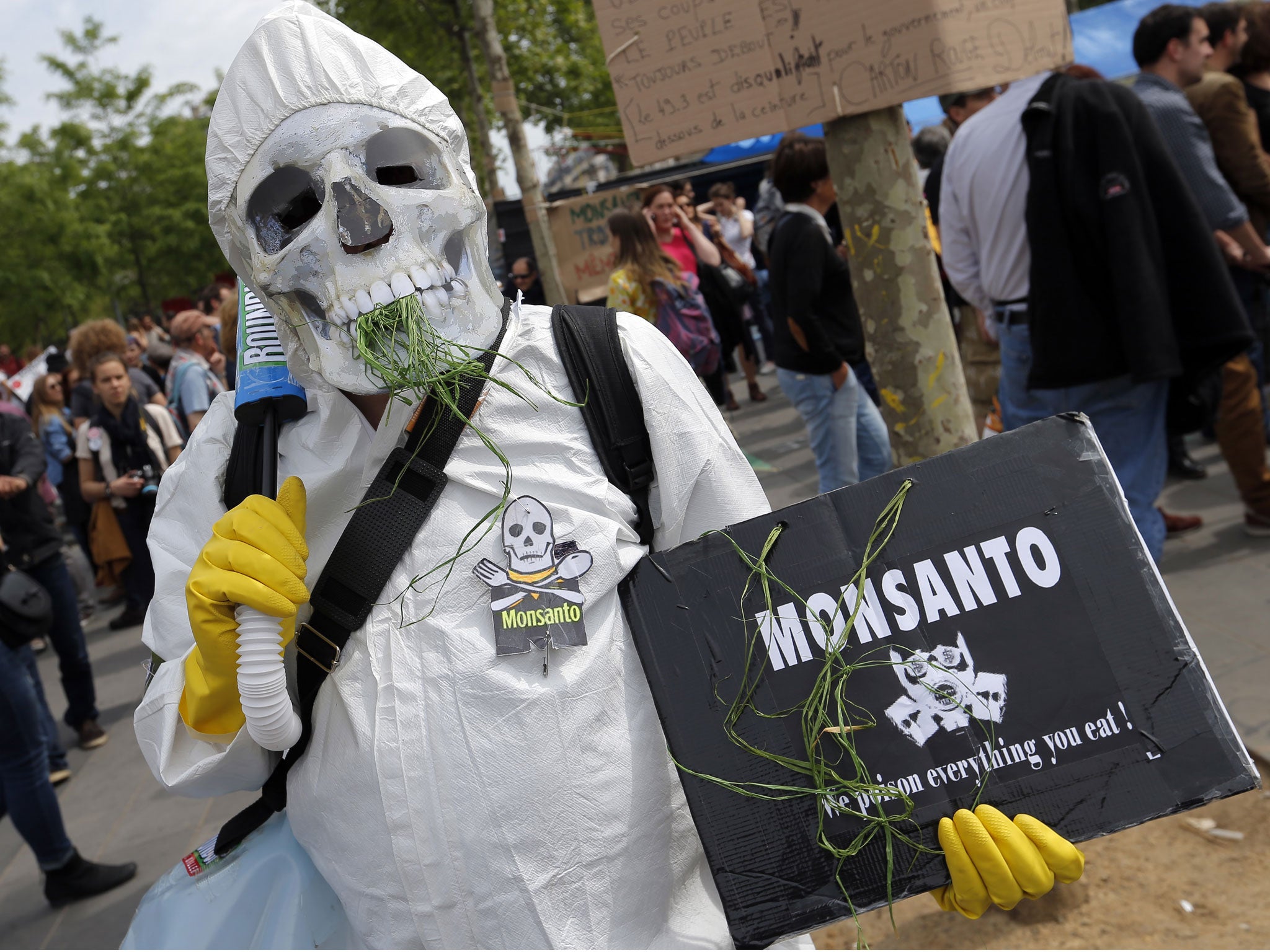Thousands protest against seed giant Monsanto ahead of Bayer merger
The protests took place in over 40 countries from the Americas, to Korea, Africa and Europe against Monsanto

Furious environmentalists have taken to streets around the world to protest against seed giant Monsanto at the same time as the company is facing a $62 billion takeover by Bayer, the German drugs giant.
More than 400 simultaneous demonstrations against genetically modified crops and pesticides were organised around the world this weekend.
The protests took place in over 40 countries from the Americas, to Korea, Africa and Europe against Monsanto.
They come come as Monsanto faces an unsolicited takeover offer by Bayer, the chemical giant that invented aspirin. The deal could create the world’s biggest supplier of farm chemical and genetically modified seeds.
Up to 3,000 protesters, rallied by environmental organisations including Greenpeace and Stop TAFTA, an anti-capitalist group, gathered in Paris, according to Agence France Presse.
Protesters voiced their anger against Monsanto’s herbicide Roundup which is classified as “probably carcinogenic to humans” by the World Health Organisation.
“Monsanto guilty of ecocide, all standing against the poisoners!” reads placard at a protest march in the French capital.
In a statement on its website, Monsanto points out that “since IARC classified glyphosate, regulatory authorities in Europe, Canada, Japan and Australia have publicly reaffirmed that glyphosate does not cause cancer.
In the US, where 90 per cent of corn, soybean and cotton is genetically modified, campaigners promoted the march with a billboard in Times Square, showing a topless model and the slogan: “Keep GMOs out of your genes.”
Another read: “Monsanto is killing me & you!”
A further 1,000 activities gathered in front of the European Parliament in Strasbourg to pay a homage to “the existing and future victims poisoned by pesticides.”
Just last week, more than 90 school children and three teachers in Peru were reportedly unwell after a plane allegedly sprayed glysophate, an active ingredient contained in Monstanto’s bestselling RoundUp.The Independent has contacted Monsanto for comment.
In London, about 100 people joined the protest supported by activists groups Stop TTIP and Global Justice Now. Mizan, one of the organisers who goes by the stage name Mizan the Poet, said he believed the demonstration was very intimate as not many Londoners are aware about the issues of GMO or have ever head even of Monsanto.
“From my perspective the aim of the movement is to create awareness about food safety, food sovereignty, democracy and well-being. We also want to create awareness about the actions of GMO food companies in the third world and their effect in it,” Mizan told the Independent.
“The issue of patenting seeds and the expensive prices placed on farmers is one amongst many, that has placed doubt in to the ethical objectives of Monsanto and GMO foods in general,” he added.
“The 22,000 people of Monsanto are committed to having an open dialogue about food and agriculture – we’re proud of the work we do, and we’re eager for people to know more about us,” Monsato said in a statement in response to the global protests.
“We know people have different points of view on these topics, and it’s important that they’re able to express and share them,” the company added.
On Monday Bayer made an unsolicited $62 billion all-cash offer to acquire Monsanto in what the German chemical company called an “extraordinary opportunity to create a global agriculture leader.”
But Franziska Achterberg, Greenpeace’s EU food policy director said a concentration of corporate power in the agriculture and chemical sector would be bad news for both farmers and consumers.
“It would accelerate the decrease in crop diversity while limiting consumer choice. Farmers would become even more dependent on just a handful of global players. They would find it harder to choose what they grow and how they grow it,” Achterberg said in a statement.
Business news: In pictures
Show all 13in May 2016, the Joint FAO/WHO Meeting on Pesticide Residues (JMPR) concluded that “glyphosate is unlikely to pose a carcinogenic risk to humans from exposure through the diet.”
European Union countries delayed a vote on whether to renew the sales authorisation of glyphosate, amid conflicting scientific opinions.
“If no decision is taken before June 30, glyphosate will be no longer authorized in the EU and member states will have to withdraw authorizations for all glyphosate-based products,” the EU commission spokeswoman said.
Subscribe to Independent Premium to bookmark this article
Want to bookmark your favourite articles and stories to read or reference later? Start your Independent Premium subscription today.

Join our commenting forum
Join thought-provoking conversations, follow other Independent readers and see their replies